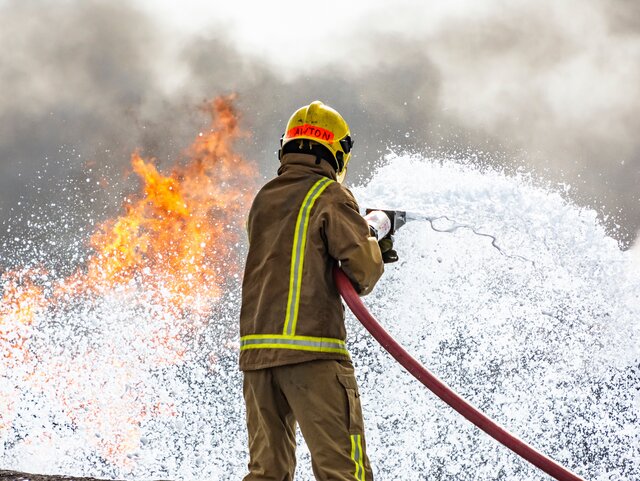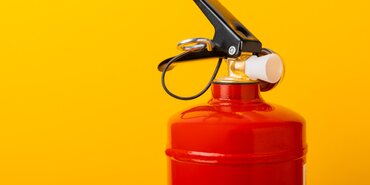FRIC Risk Alert: Bariatric Patient Rescues
1. Intended Audience
All Member Representatives; Service delivery response, specialist rescue bariatric teams, training instructors, democratic / legal services - Bariatric emergency rescue incident and non emergency requests for bariatric support.
2. Summary
This guidance document discusses the challenges and protocols surrounding the assistance provided by fire and rescue services (FRS) for bariatric patients, particularly in non-emergency situations. The report highlights various perspectives from different fire and rescue services regarding their roles, responsibilities, and the implications of assisting bariatric patients during transport to medical appointments and other non-critical situations.
Bariatric is defined as a patient who is over 25 stone. This definition of a bariatric person and for the purposes of this guidance a bariatric person is any person with a heavy body size/shape which will significantly impact on the management of an event involving Service Providers.
National statistics
The 2022 Health Survey for England estimated that 28% of adults in England were obese and a further 36% were overweight. Men were more likely than women to be overweight or obese (67% of men compared with 61% of women). Obesity is usually defined as having a body mass index (BMI) of 30 or above. BMI between 25 and 30 is classified as ‘overweight’.
FRIC Members have noticed a year on year increase in the number of emergency bariatric rescues request, although the actual figures may be higher since data only includes cases where an ambulance service has requested assistance, excluding bariatric patients involved in fires or road traffic collisions. The impact on FRS involves increased costs, training requirements, including both acquisition and requalification, and equipment needs. Fire crews attending non-classified bariatric rescues without proper training may face a higher risk of musculoskeletal injuries, which typically lead to extended periods of absence from work.
Legal and Insurance Considerations
At an FRS incident, the area involved is classed as our “workplace” and therefore elements of the Health and Safety at Work Act 1974 and Management of Health and Safety at Work Regulations 1999 will apply. These place general duties on the FRS to protect the health, safety and welfare of both their employees and other persons. FRS must take reasonable care for our own safety and that of other persons who may be affected by our acts or omissions at work.
Section 9(3)(e) of the Fire and Rescue Services Act 2004 requires us to “make arrangements for ensuring that reasonable steps are taken to prevent or limit damage to property resulting from” our response to emergencies other than fires and RTCs.
Section 11 of the Fire and Rescue Services Act 2004 provides services to respond to an event or situation that causes or is likely to cause:
(a) One or more individuals to die, be injured or become ill
(b) Harm to the environment (including the life and health of plants and animals)
The Civil Contingencies Act 2004 (CCA) directs emergency services to respond collaboratively to any event that may result in the: loss of human life, human illness or injury, homelessness, damage to property, disruption of a supply of money, food, water, energy or fuel, disruption of a system of communication, disruption of facilities for transport, or disruption of services relating to health.
The Police and Crime Act 2017 places a duty on emergency services to collaborate.
Role of the Ambulance Service
It is the responsibility of either the NHS or Ambulance Service to make provision for patient transport, treatment and support for bariatric patients that do not require emergency rescue. They should have a bariatric non emergency routine admission protocol in place detailing what to do for non emergency, risks assessments, specialist equipment and importantly that it is not the role of Fire and Rescue Service to respond. It is their responsibility to determine and effect structural alterations to facilitate safe removal or repatriation.
Non-Emergency Requests and Concerns
FRIC Members are increasingly being called to assistance ambulance with non emergency requests to move bariatric patients from home to hospital for appointments. These requests are not insured by FRIC as they do not fall within our statutory duties, and health, local authority, funeral directors and ambulance should have in place procedures, training, equipment and funding to manage these types of calls.
Additionally, using salvages sheets to move patients lacks dignity whereas specialist bariatric teams have been trained to use specialist equipment and capability to move patients effectively and efficiently. Fire and rescue services are seeing an increase in musculoskeletal injuries to backs, knees and home owners may try to claim for injury or property damage. Furthermore, these non emergency incidents tie up resources and crews become unavailable for emergency response incidents. Ambulance requests for assistance are increasing and these calls should fall under the responsibility of care providers rather than fire and rescue services. Some FRS have trained firefighters in bariatric whereas others train all their firefighters in manual handling training.
Liability Considerations
There has been a rise in musculoskeletal injuries affecting backs and knees among Members, and homeowners may file claims for injury or property damage.
Furthermore, these non-emergency incidents tie up resources and crews become unavailable for emergency response incidents. Members may want to revisit their ambulance service collaboration agreements to establish boundaries for non-medical transfers of bariatric patients, stressing the importance of establishing a cost recovery framework to cover the resources used during these events. Any agreement should highlight the necessity for medical support during these transfers to ensure patient safety and clearly document where liability rests for patient or firefighter injury, property damage, and who is the controlling mind during these events.
Training Requirements and Operational Response
The importance of training requirements for FRS when assisting bariatric patients is essential. It emphasises that untrained firefighters attending non-classified bariatric rescues may suffer injuries, particularly musculoskeletal injuries, which generally result in longer periods of absence from work. The training requirements include acquisition and requalification of skills, ensuring that firefighters are adequately prepared to handle bariatric patients safely and efficiently. Additionally, it is recommended that FRS reinforce specialist trained teams to respond to emergency bariatric incidents. Regular reminders and interventions by crew managers regarding operational procedures and safe methods of handling bariatric patients are also essential.
There is the need for clear protocols, collaboration among agencies, and a re-evaluation of the responsibilities of FRS in such situations to ensure efficient use of resources and safety for both patients and responders. If it is intended to continue to respond to non-emergency bariatric patient transfer requests, we would expect consideration of a series of risk reduction measures to be implemented, including collaboration agreements between FRS and ambulance services, risk alerts, reinforcement of specialist trained teams, and monitoring of bariatric incidents and related injuries.
Conclusion
In conclusion, this risk alert illustrates the complexities of managing bariatric patient assistance within FRS, particularly in non-emergency contexts. It underscores the need for clear protocols, collaboration among agencies, and a re-evaluation of the responsibilities of fire services in such situations to ensure efficient use of resources and safety for both patients and responders.
As Managers, Thomas Miller is not permitted to give advice, especially legal advice, to FRIC’s Members, as it is not qualified to do so. We recommend that if Members wish to understand where the conflict between the statutory duty to provide emergency response and the duty to ensure the safety of employees might sit legally, they should speak to their own legal advisors. We would of course welcome sight of any such advice should it become available.
It is not for FRIC or the Managers to stipulate how individual FRAs decide to respond to this issue. If it is intended to continue to respond to non emergency bariatric patient transfer requests, we would expect consideration of a series of risk reduction measures to be implemented, including:
- Collaboration agreement between FRS and ambulance, including cost recovery framework, liability, legal grounds and who is the controlling mind.
- Identify which agency has the contract for non emergency bariatric patient transfer, this can be an ambulance service or NHS or a third party.
- Issue risk alert reminders to staff warning of the potential hazards.
- Reinforcement of specialist trained teams to response to emergency bariatric incidents.
- Monitor number of bariatric incidents, related injuries and safety events including when attending RTC and fire incidents.
In summary, FRIC will continue to provide protection to its Members where they take an informed operational decision to save life of a bariatric patient, and an emergency request is received from an ambulance service. Members should be aware however that they will likely incur the full deductible applicable to the claim as no recourse to third parties, other than any potential contributory negligence, will be possible.
Actions Required
|
3. Impacted FRIC Guidance
None |
4. Reference Information and Further Reading
Safety sheets and NFCC advice attached. | |
Members may wish to seek a formal legal opinion on the impact of the conflict in duties of claims and criminal cases. | |
None |
- Date
- 25/02/2025


